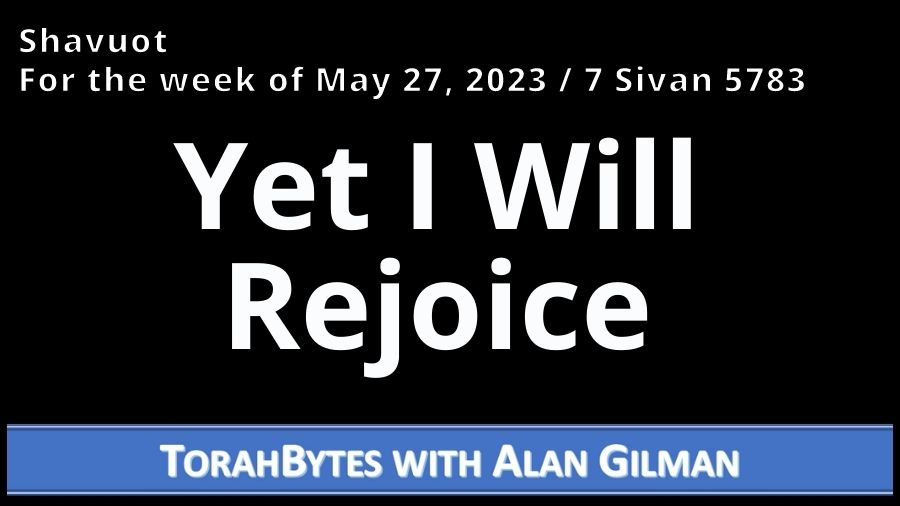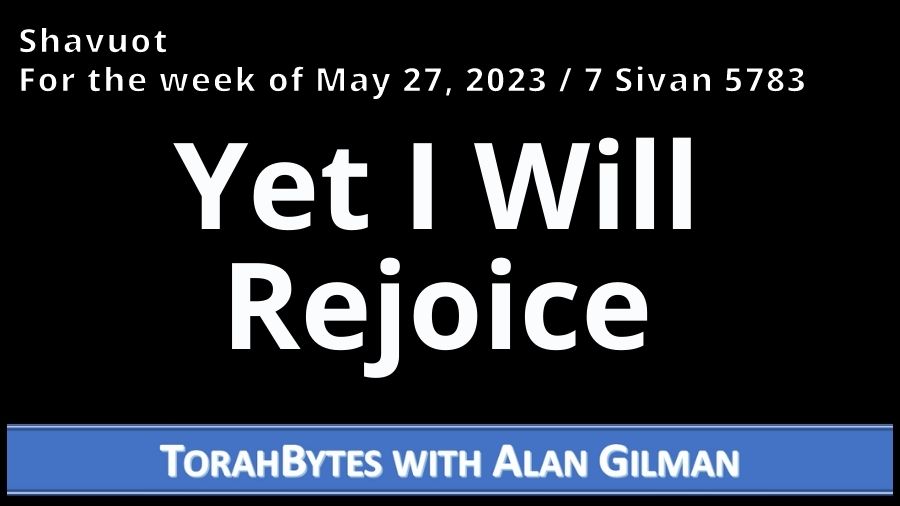
Yet I Will Rejoice
For the week of May 27, 2023 / 7 Sivan 5783

Shavuot
Torah: D’varim/Deuteronomy 14:22 – 16:17
Haftarah: Habakkuk 3:1-19
Yet I will rejoice in the LORD; I will take joy in the God of my salvation (Habakkuk 3:18)
This coming Shabbat (English: Sabbath) coincides with the festival of Shavuot (English: Weeks/Pentecost). As far as I know, no one knows for sure the exact reasons why the various Haftarah readings (portions from the Hebrew Prophets) were chosen to accompany the weekly Torah readings. Often, it is obvious due to content elements of each. This week’s reading from Habakkuk is not so obvious. Clearly, the Torah portion was chosen because it includes Shavuot, but why read the last chapter of Habakkuk? One source speculates that the description in Habakkuk of God’s dramatic exploits are reminiscent of the events at Sinai. But you might wonder, what does Sinai have to do with Shavuot? While there is nothing explicitly said in the Bible as to Shavuot’s connection to a historical event as is the case of Pesach (English: Passover), which commemorates the exodus, and Sukkot (English: Booths) which commemorates the wilderness wanderings, traditionally, Shavuot became associated with the giving of the Torah at Mt. Sinai. As Shavuot occurred fifty days after Pesach, this association is reasonable.
I would like to propose what I think is a more profound connection between Habakkuk and Shavuot. My thoughts also see a connection with the Torah but is based on the Shavuot’s primary function as a harvest festival. Here is Habakkuk 3:17-18:
Though the fig tree should not blossom,
nor fruit be on the vines,
the produce of the olive fail
and the fields yield no food,
the flock be cut off from the fold
and there be no herd in the stalls,
yet I will rejoice in the LORD;
I will take joy in the God of my salvation.
Habakkuk praised the God of Israel despite the prospect of no harvest. For many of us today it is difficult to comprehend how a failing harvest necessarily meant starvation. This is a disaster of great proportions. The book of Habakkuk features the prophet’s anguish over God’s showing him the impending doom coming upon his people at the hands of the Babylonians. Through a most painful process, he resolved to rejoice in God.
Shavuot was designed to give thanks to God for the harvest, but what do we do when there is no harvest? Our tendency is to despair, to be angry, to lash out at God perhaps. Habakkuk wasn’t blind to the terrible prospects ahead. Far from it! He felt the anguish of the coming suffering deeply. Yet he would not give up on acknowledging God for who he is.
It is fitting to remember these things at the same time we remember the giving of the Torah. The Torah constituted Israel as a nation before God based on his rescuing them from slavery in Egypt. It declared that he was Israel’s God and Israel was his people. After much consternation, Habakkuk determined that he would not allow dreaded circumstances to get in the way of his commitment to God. He came to accept that the coming devastation was the just punishment for his people’s ongoing waywardness. God had been patient for a long time, but now, the results of misguided living were coming to fruition. Habakkuk would not blame God for the evil of his people. God was still good. God was still right. God was still worthy of praise. Even though occasions such as Shavuot are designed to be occasions to rejoice over God’s provision, he no less deserves praise when he pours out much deserved punishment.
For all sorts of reasons, some deserved, some not, we go through great hardships at times. How often have we reacted to such painful circumstances by doubting or even rejecting God? It’s no easy thing to come to the place that Habakkuk did, but with God’s help we can. To do so, we need to be willing to see the difficulties of life for what they really are, including our part in bringing them about and God’s ongoing faithfulness through it all.
Scriptures taken from the English Standard Version